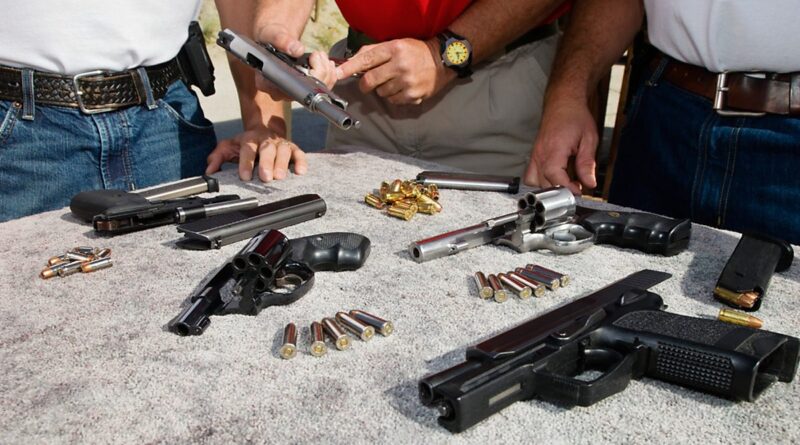The Importance of Regular Firearm Maintenance and Inspection
Firearm maintenance is crucial for ensuring safety, reliability, and longevity. Without proper care, firearms can become unreliable and even dangerous. Dirt, debris, and moisture can accumulate over time, leading to malfunctions that could pose serious risks. Regular cleaning and inspections help detect potential issues before they become major problems. Proper lubrication prevents excessive wear, reducing the chances of misfires or mechanical failures. Every responsible firearm owner must prioritize maintenance to guarantee smooth operation and accuracy when it matters most.
Neglecting firearm maintenance can lead to serious malfunctions, which can be life-threatening. A poorly maintained firearm may misfire or jam at a critical moment, causing unintended consequences. Additionally, improper maintenance can lead to permanent damage, reducing the effectiveness and lifespan of the firearm. Responsible gun ownership requires a proactive approach to firearm care, ensuring that each weapon remains in optimal condition for use when necessary. Regular maintenance habits not only enhance performance but also instill confidence in the firearm’s reliability.
Role of Inspection in Firearm Longevity
Routine inspections play a vital role in firearm maintenance. Checking for signs of wear, corrosion, or damage ensures that each component functions correctly. Firing pins, barrels, and springs can degrade over time, leading to performance issues. A thorough examination allows gun owners to replace or repair faulty parts before they fail. Inspecting ammunition is equally important since damaged rounds can cause misfires or even catastrophic failures. Consistent inspections and maintenance not only extend a firearm’s lifespan but also promote responsible gun ownership.
Ignoring inspections can lead to dangerous situations. A firearm’s barrel, for example, can develop obstructions that may cause it to explode upon firing. The trigger mechanism can wear out, leading to accidental discharges. Even small cracks or rust spots can significantly impact performance. This is why detailed, routine inspections are necessary for keeping firearms in peak condition. Owners should schedule regular maintenance checks and consider professional evaluations when needed to ensure their weapons remain reliable and safe.
Cleaning Techniques
A proper cleaning routine is essential for maintaining firearm functionality. Using a cleaning rod, patches, and a solvent removes carbon buildup and debris from the barrel. Brushes help scrub away stubborn residue, ensuring optimal accuracy and performance. Lubrication prevents rust and excessive friction, preserving the firearm’s moving parts. Over-lubrication, however, can attract dirt, which may lead to malfunctions. Owners should follow the manufacturer’s recommendations for cleaning frequency and products. Regular maintenance keeps firearms in peak condition, reducing the risk of jamming or mechanical failure.
Each firearm has its own unique cleaning requirements, but the fundamental process remains the same. First, the firearm should be disassembled according to manufacturer guidelines. A high-quality solvent should be applied to dissolve fouling and residue. A bore brush helps scrub the barrel, removing buildup that can affect accuracy. After thorough cleaning, the firearm should be dried and lightly lubricated to prevent corrosion. Consistency in these practices ensures that firearms remain functional and precise.
Safety Considerations
Safety should always be the top priority when performing firearm maintenance. Before cleaning, the gun must be unloaded, with the magazine and chamber checked multiple times. A designated cleaning area, free from distractions, ensures a controlled environment. Protective gear like gloves and safety glasses prevents exposure to chemicals and debris. Following proper procedures minimizes the risk of accidental discharges. Firearm owners should also consider professional training, such as an nys pistol permit course, to reinforce safety protocols and handling techniques. Responsible gun ownership includes understanding how to maintain and inspect firearms properly.
Proper storage is another essential aspect of firearm safety. Firearms should be kept in a secure, locked case when not in use. Ammunition should be stored separately in a cool, dry place to prevent degradation. Firearm owners should also ensure that cleaning solvents and lubricants are stored safely, away from children and pets. A comprehensive approach to firearm maintenance incorporates not just cleaning and inspection, but also safe storage and handling procedures.
Benefits of Regular Firearm Maintenance
Firearm maintenance offers long-term advantages beyond safety and performance. Well-maintained firearms retain their value, making them reliable assets for generations. Proper care prevents costly repairs and replacements, saving money in the long run. Hunting, competitive shooting, and self-defense all require dependable firearms that function without issue. A commitment to regular maintenance ensures that firearms operate flawlessly in any situation. By following best practices, owners can uphold safety standards while preserving the integrity of their firearms for years to come.
Neglecting maintenance can lead to irreversible damage. Corrosion can weaken a firearm’s structural integrity, rendering it unsafe to use. Malfunctioning parts can reduce accuracy, making the firearm unreliable in critical situations. Regular maintenance preserves the firearm’s performance, ensuring that it operates with precision and efficiency. Those who invest time in maintaining their firearms can be confident that their weapons will perform effectively whenever needed.
Regular firearm maintenance also fosters a deeper understanding of the weapon’s mechanics. Owners become familiar with how each component functions, allowing them to troubleshoot minor issues and enhance their shooting skills. This hands-on experience builds confidence in handling firearms safely and effectively. Whether for recreational use, professional applications, or self-defense, properly maintained firearms provide reliability and peace of mind.
Ultimately, firearm maintenance is not just about preserving equipment; it is about ensuring safety and responsibility. Gun owners who take the time to care for their firearms demonstrate a commitment to responsible ownership. Proper maintenance helps prevent accidents, ensures reliability, and extends the firearm’s lifespan. A well-maintained firearm is a dependable tool, capable of performing when needed while upholding the highest safety standards.




